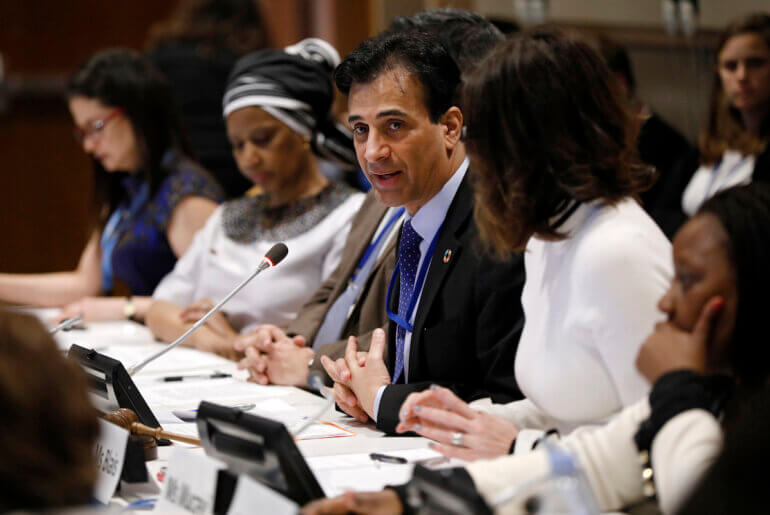Published in Mondoweiss. DECEMBER 14, 2023
BY JEFF WRIGHT
Interest in the withering four-page letter that Craig Mokhiber, former Director of the New York Office of the UN’s High Commissioner of Human Rights, wrote on October 28 to High Commissioner Volker Turk—charging that the UN has failed in its mission to prevent a “textbook case of genocide” in Gaza—has not waned. Last week, nearly 1,000 people from around the globe attended a webinar with Mokhiber co-hosted by the Palestinian Christian Alliance for Peace (PCAP) and Friends of Sabeel North America (FOSNA).
Mokhiber, an attorney specializing in international human rights, worked for the UN in increasingly impactful roles for over three decades and lived in Gaza in the 1990s. Following last week’s webinar, he spoke with Mondoweiss. Here is a slightly edited version of our wide-ranging interview.
Mondoweiss: How do you explain Biden’s continued support of Israel’s devastating war on Gaza?
Craig Mokhiber: I have to say, it doesn’t surprise me. The U.S. has marched in lockstep with Israel throughout a whole series of attacks by Israel on Palestinian civilian populations for decades now. I’ve been saying in regard to the current situation, the U.S. is committing legal complicity as defined by the Genocide Convention. Complicity is a specific crime under the [1948 United Nations] Convention on the Prevention and Punishment of the Crime of Genocide. In the past, when genocides were emerging, the sin of the U.S. was that it didn’t do anything to stop them.
The U.S. is committing legal complicity as defined by the Genocide Convention.
When the genocide was unfolding in Rwanda, the case I saw very closely in my previous job, the U.S. gave instructions to its diplomatic missions not to use the word genocide. They understood that if they used the word, they would be compelled by international law to take action to stop it. They didn’t want to.
In this case, it’s not just that they haven’t taken action to stop it. They have been actively participating in it. While these atrocities have been happening in real-time, the U.S. has been arming, financing, and providing intelligence support and diplomatic cover—even repeatedly providing the veto to stop a ceasefire so that Israel can continue to carry on these acts. That amounts to complicity under international law. And it explains why there is now legal action taken by the Center for Constitutional Rights to hold them accountable for this specific crime in the Genocide Convention.
Biden is doing what every Democrat and Republican has done going back decades. In this case, where Israel’s actions amount to genocide, it is particularly remarkable because, one, it is exposing U.S. government officials to legal action regarding genocide. Two, there’s no question that Biden is paying a very high political cost. He is getting ready next year for a competitive election, presumably against Donald Trump, where they were neck and neck. He has now lost significant support because he has lost votes as a result of what Americans view to be his unconditional support for Israel’s activities. He’s lost support from the progressive Jewish community, from Arab Americans, from Muslim Americans, from African Americans, from young people. All of them lined up against the Israeli onslaught. I can’t imagine that Biden’s people were not aware of these political costs.
But the degree of political capture of U.S. political institutions is so absolute now that they don’t even care what the American people think. Polls have shown that the vast majority of Americans—Republicans and Democrats—oppose this onslaught and want a ceasefire and a cutback on aid going into this process. If you look not just at the rhetoric of the members of Congress on both sides of the aisle and the State Department and the entire Executive Branch on the one hand, and the position of the American people on the other hand—before you even get into a moral position or a legal position which are all on the other side as well—you see just how wide the disconnect has grown between what the American people want—human decency, morality, human rights, international law—and the position of elected officials and the administration.
There are people who benefit from this—weapons manufacturers, technology companies, and Israel lobby groups who are all in, 100%—who are using all of the influence they have, pressure, carrots and sticks, to make sure that the U.S. remains completely aligned with Israel’s ethnic purge of the Gaza Strip.
Talk about the conversation that’s had now between “the rule of law” and “the rules-based order.”
That phrase, the rules-based order, has been made up in the corridors of the State Department. It doesn’t mean anything in international law. What it has come to mean is a way to sidestep the specificities of international law, because U.S. obligations in the international arena are framed by international law just as the obligations of every one of 193 countries are framed by this same international law. The United States has not been a good friend of international law in general.
There’s a long tradition of American disdain for international law.
But there’s a long tradition of American disdain for international law. When it comes to international human rights law, the framework of the laws that has been built since the Second World War to make sure that states can’t abuse their power to subject people to violations of human rights like torture, summary execution, arbitrary arrest and detention, denial of health care, food, housing, water and sanitation, discrimination, the U.S. is a country that has one of the worst ratification records of international human right treaties. There are 193 countries in the world. Every one of them has ratified the Convention on the Rights of the Child, the treaty that protects the human rights of children, except one country, and that’s the United States of America, the only country on the planet that hasn’t ratified the main treaty to protect the rights of the children. It’s symbolic of their general attitude to international law.
The U.S. Constitution says that international law is the law of the land. Treaties that are ratified by the U.S. are the law of the land. But when you hear discussions in U.S. courts, for example—the legal tradition in the U.S. is very anti-international law—they refer to international law as “foreign law.” It’s not foreign law, it’s your law, you’re a part of it, you helped develop it, and then you voluntarily signed on to it. So, the U.S. is not a good friend of international law.
The United States refuses to ratify the Rome Statute. The U.S. opposes efforts to hold accountable perpetrators of war crimes, crimes against humanity, ethnic cleansing, genocide, and gross violations of human rights by international mechanisms if the perpetrator is a friend of theirs. They block, undercut, prevent, smear, and generally obstruct mechanisms that have been set up to hold Israel accountable for previous violations of international law. If the International Criminal Court ever tries to take action against any U.S. person or any of their allies, it may face U.S. military intervention. Congress actually passed an act, nicknamed the Hague Invasion Act, stipulating that the U.S. is authorized to use military force to attack the ICC in the Hague in order to grab a person that they don’t want to be prosecuted. In other words, to free a war criminal.
To read the whole text: https://shorturl.at/fnY48




